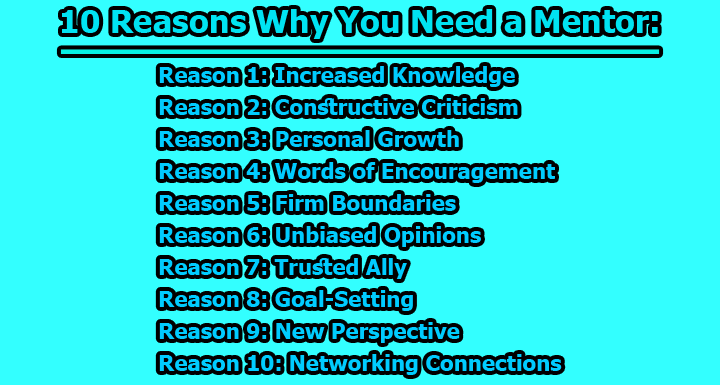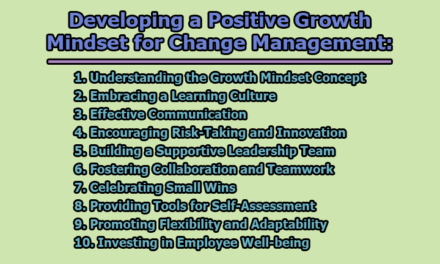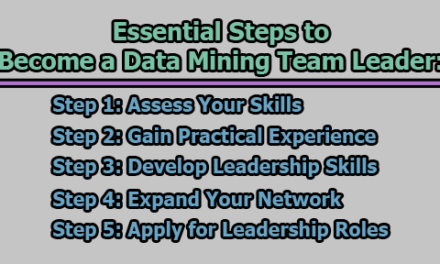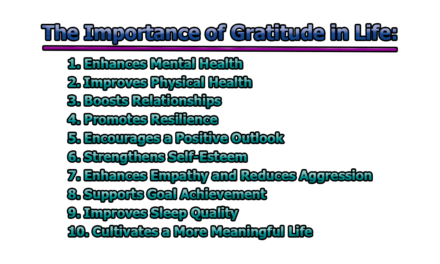10 Reasons Why You Need a Mentor:
In the journey of personal and professional development, finding a mentor can be a transformative experience. A mentor is an experienced and trusted advisor who guides, supports, and encourages individuals to achieve their goals and unlock their full potential. Whether you are a student, a budding entrepreneur, or an established professional, having a mentor can significantly impact your growth and success. In this article, we will delve into the 10 reasons why you need a mentor.
Reason 1: Increased Knowledge:
Mentors are invaluable sources of knowledge and expertise in their respective fields. Their years of experience provide insights and practical know-how that can’t be found in textbooks or academic settings. By learning from someone who has already faced and overcome challenges, you can avoid repeating their mistakes and benefit from their proven strategies for success.
Mentors possess a wealth of industry-specific knowledge, insights into market trends, and an understanding of best practices. Through regular interactions with your mentor, you gain access to this wealth of information, which can significantly accelerate your learning curve and set you apart from your peers.
Reason 2: Constructive Criticism:
Receiving constructive criticism from a mentor is a gift that allows you to grow and improve. Unlike praise or validation from friends and family, constructive criticism points out areas for improvement, helping you to become a better version of yourself.
A mentor’s feedback is rooted in their desire to see you succeed. They understand that identifying and addressing weaknesses is essential for personal and professional growth. Embracing constructive criticism with humility and a growth mindset empowers you to evolve and excel in your endeavors.
Reason 3: Personal Growth:
Mentors play a crucial role in your personal growth journey. They guide you in understanding your strengths, weaknesses, and areas of interest. By recognizing your unique attributes, you can align your goals with your natural inclinations, increasing the likelihood of success and fulfillment.
Mentors challenge you to step outside your comfort zone and take on new challenges. This process of pushing boundaries cultivates resilience, adaptability, and self-confidence. As you conquer challenges and achieve milestones, your sense of accomplishment contributes to your personal growth and development.
Reason 4: Words of Encouragement:
In the face of setbacks and uncertainties, a mentor’s words of encouragement can be a driving force behind your motivation. Their belief in your abilities instills self-assurance and propels you to keep pushing forward even when faced with obstacles.
Encouragement from a mentor fosters a positive mindset and cultivates a sense of determination. You begin to view failures as opportunities for learning and growth, embracing challenges with optimism and perseverance.
Reason 5: Firm Boundaries:
Mentors help you establish firm boundaries to optimize your productivity and focus. They understand the importance of effective time management and discipline in achieving success.
By setting clear boundaries, you gain the ability to prioritize tasks and avoid distractions. Your mentor holds you accountable for your commitments, ensuring that you stay on track and remain consistent in your efforts.
Reason 6: Unbiased Opinions:
Mentors provide objective and impartial opinions based on their expertise and experiences. Unlike friends and family, whose advice may be influenced by personal biases, a mentor’s guidance is focused solely on your growth and development.
Relying on unbiased opinions enables you to make well-informed decisions, free from emotional attachments. Your mentor offers fresh perspectives, challenges your assumptions, and encourages you to explore alternative approaches to problem-solving.
Reason 7: Trusted Ally:
A mentor becomes a trusted ally and confidant with whom you can share your aspirations, fears, and challenges. The mentor-mentee relationship is built on mutual trust and confidentiality, creating a safe space for vulnerability and open communication.
The ability to confide in someone who genuinely cares about your growth can be immensely beneficial. Your mentor listens, understands, and supports you through both triumphs and struggles, providing guidance and encouragement along the way.
Reason 8: Goal-Setting:
Mentors play a pivotal role in helping you set clear and achievable goals. They assist you in defining your long-term vision and breaking it down into smaller, actionable steps.
Collaborating with your mentor in goal-setting ensures that your objectives are realistic, measurable, and aligned with your values. Regular check-ins and progress assessments keep you accountable and focused, driving you toward successful goal attainment.
Reason 9: New Perspective:
Mentors bring fresh perspectives to your experiences and challenges. Their diverse backgrounds and experiences enable them to view situations from different angles, stimulating creativity and innovation.
Exposure to new perspectives broadens your horizons and enhances your problem-solving abilities. You become more open to unconventional solutions, adapting more readily to changing circumstances in your personal and professional life.
Reason 10: Networking Connections:
Mentors often have extensive networks within their industries or fields of expertise. Leveraging their connections can be a game-changer in your career or business ventures.
Through networking facilitated by mentors, you gain access to influential individuals, potential clients, and collaborative partners. Building relationships with key players in your industry expands your opportunities and opens doors to new and exciting possibilities.
In conclusion, mentorship is a powerful catalyst for personal and professional growth. Embracing the guidance of a mentor exposes you to increased knowledge, constructive criticism, and valuable insights. Their encouragement fosters resilience and confidence, pushing you to achieve your goals and dreams. Establishing firm boundaries, receiving unbiased opinions, and building a trusting mentor-mentee relationship create a supportive environment for your growth journey. Collaboration in goal-setting and exposure to fresh perspectives enrich your experiences and enhance your problem-solving abilities. Moreover, mentors’ extensive networks offer valuable networking connections that can elevate your career or business prospects. So, seeking and embracing mentorship is a wise investment in your future success and fulfillment.
Frequently Asked Questions [FAQs]:
What is mentorship, and why is it important?
Mentorship is a relationship between an experienced and knowledgeable individual (the mentor) and a less experienced individual (the mentee) seeking guidance and support in personal and professional development. Mentorship is essential because it offers the mentee access to valuable insights, knowledge, and expertise that can accelerate their growth and success. It provides a safe and supportive environment for learning, feedback, and goal-setting, contributing to the mentee’s overall personal and professional development.
How do I find a mentor?
Finding a mentor involves identifying individuals who have the expertise and experience in your area of interest or industry. Start by networking within your field and attending industry events or conferences. Online platforms and professional organizations can also connect you with potential mentors. When approaching a potential mentor, be respectful of their time and express your specific goals and the value you hope to gain from the mentorship.
What should I look for in a mentor?
When choosing a mentor, look for someone with experience and knowledge in your area of interest. Seek someone who is approachable, communicative, and invested in your growth. A mentor should be willing to provide honest feedback, offer guidance, and genuinely care about your development. Additionally, shared values and a good personality fit are essential for a successful mentor-mentee relationship.
What are the benefits of being a mentor?
Mentoring offers several benefits to mentors as well. It allows them to give back to their industry or community by sharing their knowledge and expertise. Mentoring can also enhance a mentor’s leadership and communication skills. Moreover, mentors often find fulfillment in witnessing their mentees’ growth and success, contributing to a sense of legacy and positive impact.
How often should I meet with my mentor?
The frequency of mentor-mentee meetings may vary depending on individual preferences and goals. Some mentorships may involve regular, scheduled meetings, such as once a month, while others may be more informal and ad-hoc. It’s essential to establish clear communication and expectations regarding meeting frequency and availability to ensure a productive and mutually beneficial mentorship.
Can a mentor help me with my career goals?
Yes, mentors can be invaluable in guiding you toward achieving your career goals. They can offer insights into career paths, provide advice on professional development, and help you make informed decisions. Mentors can also offer support in networking and making valuable connections within your industry, enhancing your career prospects.
What is the difference between a mentor and a coach?
While both mentors and coaches provide guidance, there are some key differences between the two roles. A mentor typically has industry-specific experience and acts as a trusted advisor, offering insights and knowledge based on their expertise. A coach, on the other hand, focuses on helping individuals set and achieve specific goals, often using structured techniques and tools. While a mentor’s guidance can be more informal and relationship-oriented, coaching tends to be more goal-oriented and results-driven.
How long should a mentorship last?
The duration of mentorship can vary depending on the mentee’s goals and the mentor’s availability. Some mentorships may last for a few months, while others can extend over several years. It’s essential to have an open and honest discussion with your mentor about the expected duration of the mentorship and whether there is a possibility of continuing the relationship beyond the initial timeframe.
What if I have multiple areas of interest? Can I have multiple mentors?
Yes, having multiple mentors is not uncommon, especially if you have diverse areas of interest or career goals. Each mentor can provide unique insights and expertise in their respective fields. Having multiple mentors allows you to gain a broader range of perspectives and knowledge, enriching your overall development.
Is mentorship limited to a specific age group or career level?
No, mentorship is not limited to a particular age group or career level. It is valuable for individuals of all ages and career stages. Whether you are a student seeking guidance, a mid-career professional looking for career advancement, or a senior executive seeking leadership advice, mentorship can provide significant benefits in any phase of life or career.

Library Lecturer at Nurul Amin Degree College










